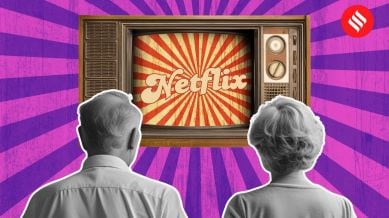The era of ‘Netflix parents’ is here and it’s changing Indian living rooms
As a generation of parents turn to OTT shows, compelling stories may be making taboo subjects palatable.

My parents have witnessed multiple phases of my life. Some are quietly discussed at home, and others form entertaining anecdotes at dinners with family and friends. As a former child who has become somewhat of an adult, with all the newfound perspective your 20s bring, I have come to realise that they grew up with me. And just as they carefully observed and catalogued my phases, I can do the same with theirs, like my dad’s brief obsession with newspaper-print wallpaper or the couple of years my mum was really into ghazals when I was in primary school.
The most recent one that I have noticed isn’t limited to just my home, but is quietly taking place across most Indian households. We were too focused on the iPad babies and the next generation to realise that our parents’ TV habits have undergone a significant change. The boredom of the Covid-19 pandemic has ushered in a new generation of parents — the Netflix parents.
I had assumed parents would struggle to adapt to Netflix, just as they had with the other technological advancements imposed upon them. After all, they grew up with curated TV schedules and movie stars that were hard to let go of. If there was one thing I believed about their generation, it was their deep attachment to nostalgia and the “greatness” of the past. I imagined their use of OTT platforms would be limited to reruns of favourite shows or the occasional movie I convinced them to watch. And even if they did warm up to it, I expected it to coexist with cable TV, not replace it entirely.
Until last month, when my mum asked me if I had watched “this show called ‘Adolescence’”. I would be lying if I said I wasn’t taken aback. The show has a grim storyline with no bright sets or on-screen drama. As someone who is chronically online, I had witnessed the praise it had garnered and added it to my watch list. But I had not expected my mum to bring it up. It then struck me that over the last few years, she had been in and out of the many OTT platforms we had access to. In fact, she had recommended shows to me in the past, and I hadn’t thought much of it. Now, it made complete sense.
For all the high-octane, needlessly dramatic TV serials they were exposed to, the quality of OTT shows being offered is unmatched. Their stories, rooted in ground reality, and casts that don’t necessarily look heroic are a refreshing antidote to mass entertainment with poorly-drawn characters, chiselled heroes, light-eyed heroines and tearjerker melodramas.
Take, for instance, Scam 1992 (2020), which fed my obsession with the stock market. For my father, the show was enjoyable not just because of the stellar performance of the protagonist, Pratik Gandhi, but because he could recount the turmoil of the stock market crash of the time.
Perhaps the biggest takeaway for me was the ease with which difficult topics, rarely discussed in real life, became palatable to them when put in the form of a compelling story—whether it’s divorce, crude language, inter-caste marriage or even extra-marital affairs. They watched Made In Heaven (2019), a show based on faltering relationships and the truth behind flashy unions—a concept not often spoken of in most Indian homes—with rapt attention, sympathising with the protagonists. Even Indian Matchmaking (2020), which pokes fun at the traditional and parochial ways of arranged marriages, gets a laugh out of them. You (2018), a show featuring an obsessive stalker and his dark humour, had my mum binge-watching.
Top shows today have stories, dialogues, fleshed-out characters, and sets, which are painstakingly crafted to blur the line between fiction and reality, like in Bridgerton (2020). It is this attention to detail and brave choice of topics, such as in Aashram (2020), that make this transition believable and, well, inevitable.
It is generally accepted that our parents are ‘separate’ from us; they don’t understand the world we come from. Growing up dispels some of these delusions. Being able to discuss an episode of This Is Us (2016), a brilliant chronicle of complex interpersonal relationships, with your mum over evening chai feels like a huge step in that direction. We may think we are different from our parents, but liking the same shows —right down to my mum’s ‘rabbit’ profile picture on her Netflix account — humanises them so much more. Maybe the next time we contest on something, I could just recommend them a show about it.
(Shaima S is a contributing writer with the indianexpress.com)